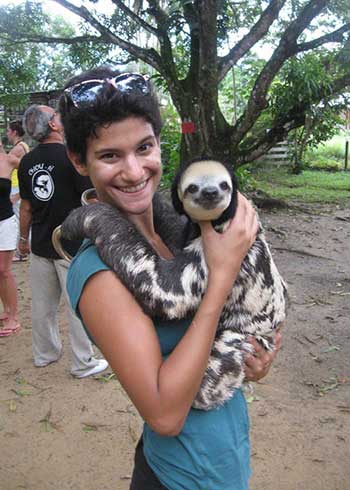Katherine Kolios ’12
Oh, the Places She’ll Go — With Language
When Katherine Kolios ’12 arrived at Brandeis in 2008, she had no intention of majoring in French. Though she had studied the language since middle school, she wasn't confident that her skills were up to snuff.
But something told her to continue with her French studies, if for no other reason than it provided the most efficient path to satisfying the university's language requirement. It wasn't long before she learned just what a consequential decision she had made.
 Katherine Kolios holds a sloth at a sanctuary in French Guiana.
Katherine Kolios holds a sloth at a sanctuary in French Guiana.
Kolios quickly noticed the dedication of the faculty in the department of French and Francophone studies, the collegial transparency of the professors, and the value of advancing her French skills for the purpose of studying abroad. In particular, she appreciated the direct approach that the French department had to building its student base and community.
At some point early in Kolios' career at Brandeis, Professor Jane Hale informed her that she was on track to complete a French major, asking what the department could do to facilitate her commitment to the program. Although very few students took French courses with the idea of declaring a major in the language, Kolios acknowledged that "the department did an amazing job identifying the people who would be interested in doing that and finding a way to make that path work for them."
Kolios has been pursuing that path since her conversation with Hale. First, she completed a year abroad, spending one semester in France and a second in Switzerland, a hub for a number of multinational NGOs, an experience that corresponded well with her desire to bridge French and her other major, health: science, society and policy. After graduating from Brandeis, Kolios participated in the Teaching Assistant Program in France, where she taught English in French Guiana and had the opportunity to travel to two French-speaking islands, Guadeloupe and Réunion. Afterward, she worked in Rwanda, a former Belgian colony where one of the official languages is French.
Kolios currently works as executive director of a small nonprofit organization, Rain for the Sahel and Sahara, that does work in Niger. In her position, her mastery of French has proven to be a useful professional tool. Working in the global health field since leaving college, Katherine has found that many domestic global health companies search for candidates who speak Spanish, Mandarin and Hindi, but with international public health, particularly for those working in Africa, there have been plenty of opportunities to put her French skills to use.
Kolios says she has been "struck post-graduation at how many opportunities I've had that I wouldn't have had if I hadn't learned French. Even though it wasn't the primary skill set for what I was trying to do, it was an enormously useful secondary tool." In this respect, she strongly believes that we should try to reorient our thinking about languages toward their practical value, as we do with many other academic subjects.
For instance, we learn English not necessarily to write a book, but rather to read and write at a certain level in order to complete certain tasks. Along the same lines, we develop skills in math and computer science, not always to become a programmer but instead to advance in various aspects of our professional and personal lives.
"You can ask yourself, what can I do with this language? Where can I go?" Kolios said.
The places and possibilities of language are not just limited to literal travel, either. Thinking about and in another language has allowed Kolios to think about her place in the world and empathize with others. She remembers learning about the Sapir-Whorf hypothesis (also known as the linguistic relativity hypothesis) in an anthropology class, the idea that the language we speak shapes the way we see the world. In that sense, French isn't just English in French words.
"Because the language is different," she said, "it gives you another way of thinking about things. Part of that is the culture, but part of that is the language itself. You are literally able to think different thoughts when you learn a different language."
Learning languages allows people to understand other perspectives better. It is very easy to underestimate the challenges of someone coming to your country or when you are traveling to a place where you don't speak the language or where it's a language you are learning. In some ways, the experience of learning another language allows you to feel empathy, which hopefully you would have anyway, but your own learning experience makes these struggles feel real in a different way: "You relate to people differently. You have a better understanding of what it's like to show up in a new country."
Kolios considers bilingualism a "severely under-appreciated skill in the U.S." and this puts Americans at a disadvantage. Virtually everywhere else in the world, people learn at least two languages, and more. In Niger, for example, people habitually speak three languages when they are uneducated, but with education, it can be upward of nine. When Nigerians ask her how many languages she speaks, she feels awkward saying "I speak two, kind of."
She regrets not learning more languages at Brandeis: "When you are at school, there is a structure for it." If there are fears that being perfect in a language takes a lot of time, Kolios believes that any amount of language is good. "We need to reorient how we think about learning and using languages in terms of some level of proficiency. You can do so much in a language that you don't speak perfectly. Maybe you can't translate for the UN but for traveling and meeting people, it's more than enough."
This interview was conducted in 2018-19 by Diana Filar, PhD’21.